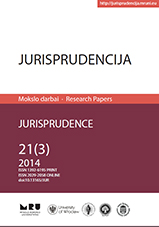KONFIDENCIALUMO REIKALAVIMŲ TEISINIAI PAGRINDAI VIEŠUOSIUOSE PIRKIMUOSE
LEGAL BASIS FOR THE DUTY OF CONFIDENTIALITY IN PUBLIC PROCUREMENT
Author(s): Dainius KenstavičiusSubject(s): Law, Constitution, Jurisprudence
Published by: Mykolas Romeris University
Keywords: public procurement; confidentiality; transparency; public interest
Summary/Abstract: The main focus of this article is the legal basis of the duty of confidentiality and its content during the procedures of public procurement and during the disputes regarding the legality of decisions made by the contracting authorities. Only those cases which are associated with contracting authorities’ duty to keep information of other suppliers confidential are analyzed. The actual problems are related to the requests of a supplier in order to get certain information about other suppliers in pre-trial disputes and during litigation. The legal basis of the duty of confidentiality is established in national law as well as in European Union Directives. Due to the relatively laconic legal regulation, case law becomes very important, which provides additional rules and practical solutions to the problems that arise. In order to analyze the legal basis of the duty of confidentiality, at first the conception of confidential information should be determined. The conception of confidential information is disclosed in other branches of the law. Secondly, the limits of duty to keep information confidential should be analyzed. However, the duty of confidentiality during the procurement procedures and legal disputes has its own specifics. The duty of confidentiality should be balanced with the principle of transparency, basically meaning the requirement of publicity during public procurement procedures. The principle of transparency is very important, because if this principle is violated, it is sufficient to require the court to declare illegal actions made by contracting authority. Weiner, K. Towards European Preferences? Implications of Directive 2009/81/EC on Domestic Preferences in Defense Procurement. The procurement lawyer. 2012 (Spring). The general criteria for information to be held as confidential are also applicable to the public procurement of legal relationship, but there are some specific criteria. The principle of transparency often causes a conflict between the duty of confidentiality and publicity. However, it is necessary to disclose certain information, which means that public procurement legal regulation should be interpreted so as to allow the greatest possible opportunities to ensure transparency. Also, the duty of confidentiality quite often contradicts the public interest to ensure the transparent and legal public procedures. As a result, the public interest in public procurement litigation requires the court to be active and, if necessary, to collect evidence – if necessary, even the supplier’s confidential information. The active role of the court is necessary to ensure transparent and legal public procurement procedures.
Journal: Jurisprudencija
- Issue Year: 21/2014
- Issue No: 3
- Page Range: 803-821
- Page Count: 19
- Language: Lithuanian

